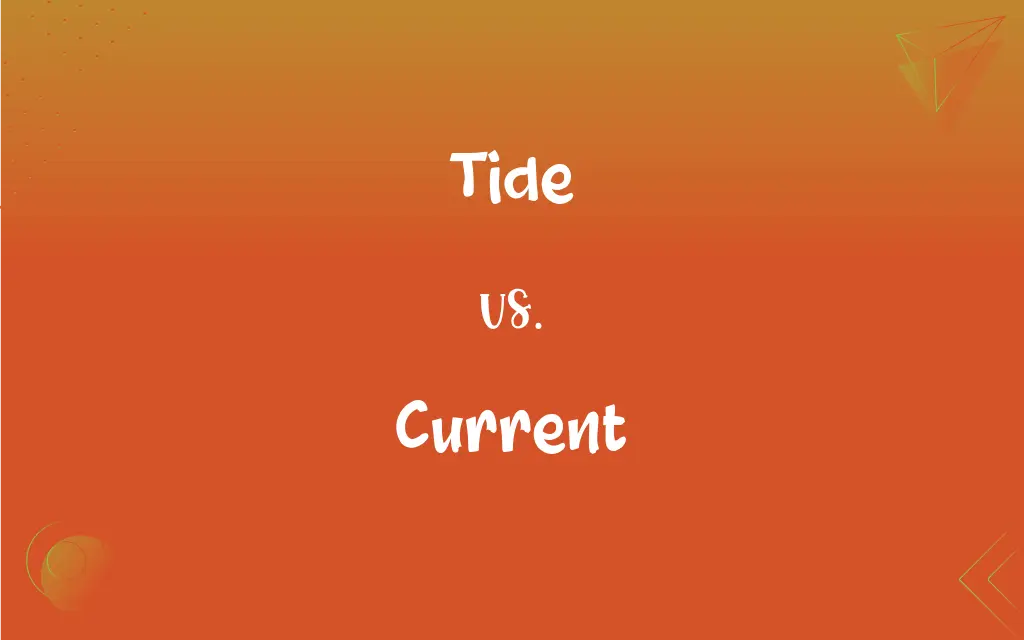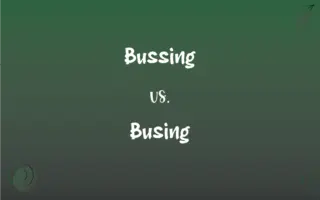Tide vs. Current: What's the Difference?
Edited by Aimie Carlson || By Janet White || Updated on November 16, 2023
Tide refers to the rise and fall of sea levels caused by gravitational forces of the moon and sun. Current refers to the continuous, directed movement of seawater generated by various forces.

Key Differences
Tides are the periodic rise and fall of sea levels, primarily influenced by the gravitational pull of the moon and sun. Currents, however, are the continuous, directed movements of water in the ocean, caused by factors like wind, salinity, and temperature differences.
Tides occur with a predictable rhythm and affect coastal regions globally, playing a crucial role in shaping shorelines. Currents, in contrast, can vary greatly in speed and direction and influence global climate patterns and marine navigation.
Tides can be classified into types like spring and neap tides, based on the moon's position relative to the earth and sun. Ocean currents are categorized into surface currents, driven by wind, and deep ocean currents, driven by density differences.
The timing and magnitude of tides are influenced by geographical location and topography. Ocean currents are influenced by factors like the earth's rotation, wind patterns, and the shape of ocean basins.
Tides have a significant impact on marine life, especially in intertidal zones, while currents play a crucial role in distributing nutrients and heat across the ocean.
ADVERTISEMENT
Comparison Chart
Driving Forces
Gravitational pull of the moon and sun.
Wind, earth's rotation, temperature, salinity.
Predictability
Highly predictable, rhythmic.
Variable, can change with weather and climate.
Types
Spring, neap tides based on lunar cycle.
Surface, deep ocean currents based on cause.
Geographic Influence
Affects coastal regions, dependent on topography.
Global influence, shapes climate and ecosystems.
Impact on Marine Life
Affects intertidal zones and marine organisms.
Influences nutrient distribution, migration routes.
ADVERTISEMENT
Tide and Current Definitions
Tide
The regular rising and falling of the sea level.
The tide was high, covering the sandy beach.
Current
A continuous movement of seawater driven by various forces.
Ocean currents play a key role in climate regulation.
Tide
A natural phenomenon involving water level changes.
We timed our boat launch with the incoming tide.
Current
The flow of water moving in a specific direction in the sea.
The strong current carried the boat away from shore.
Tide
A periodic change in the elevation of the ocean's surface.
Low tide exposed the coral reefs.
Current
The horizontal movement of water in response to different factors.
Marine animals use ocean currents to travel long distances.
Tide
The vertical movement of the sea, linked to lunar cycles.
Spring tides occur during new and full moons.
Current
A stream of water moving within a larger body of water.
Currents can greatly affect navigation and shipping routes.
Tide
The movement of the sea caused by gravitational forces.
The full moon brought exceptionally high tides.
Current
A directional water flow in a river, sea, or ocean.
Swimming against the current was exhausting.
Tide
The periodic variation in the surface level of the oceans and of bays, gulfs, inlets, and estuaries, caused by gravitational attraction of the moon and sun.
Current
Belonging to the present time; present-day
Current events.
Current leaders.
My current address.
Tide
A specific occurrence of such a variation
Awaiting the next high tide.
Current
Being in progress now
Current negotiations.
Tide
Flood tide.
Current
Commonly accepted or used; prevalent
Current fashions.
Current technology.
FAQs
What causes tides?
Tides are caused by the gravitational forces of the moon and sun.
What generates ocean currents?
Currents are generated by wind, earth’s rotation, and water density differences.
Are currents constant?
Currents can change with weather, climate, and geographical features.
What are spring tides?
Spring tides are exceptionally high tides occurring during full or new moons.
Can tides be predicted?
Yes, tides can be predicted with high accuracy.
Do tides affect river levels?
Yes, tides can influence river water levels, especially near the mouth.
Are ocean currents fast?
Some currents are fast-moving, while others are relatively slow.
How often do tides occur?
Tides occur roughly every 12 hours due to the moon's orbit.
What is a rip current?
A rip current is a strong, localized, and narrow current flowing seaward.
Are tides the same globally?
No, the magnitude and timing of tides vary across different regions.
What is the Gulf Stream?
The Gulf Stream is a warm and swift Atlantic Ocean current.
How do currents affect climate?
Currents distribute heat and nutrients, impacting global weather patterns.
What is a neap tide?
Neap tides are moderate tides occurring when the sun and moon are at right angles.
Do tides affect fishing?
Yes, tides can significantly impact fish behavior and fishing conditions.
How do currents affect marine life?
Currents influence migration, feeding, and breeding of marine life.
How do tides influence navigation?
Tides affect water depth, crucial for safe marine navigation.
Can currents change direction?
Yes, some currents change direction seasonally or due to other factors.
Can currents be used for energy?
Yes, the kinetic energy of currents can be harnessed for power.
Do tides impact coastal erosion?
Yes, tides play a significant role in shaping and eroding coastlines.
Are there currents in lakes?
Yes, currents can also occur in large lakes due to wind and temperature differences.
About Author
Written by
Janet WhiteJanet White has been an esteemed writer and blogger for Difference Wiki. Holding a Master's degree in Science and Medical Journalism from the prestigious Boston University, she has consistently demonstrated her expertise and passion for her field. When she's not immersed in her work, Janet relishes her time exercising, delving into a good book, and cherishing moments with friends and family.
Edited by
Aimie CarlsonAimie Carlson, holding a master's degree in English literature, is a fervent English language enthusiast. She lends her writing talents to Difference Wiki, a prominent website that specializes in comparisons, offering readers insightful analyses that both captivate and inform.































































